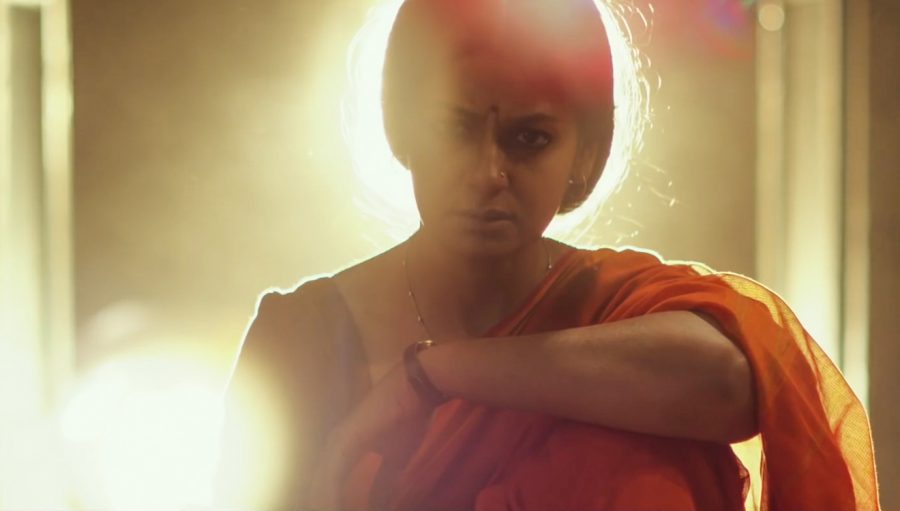My body, my choice – this affirmation forms the core of pro-choice arguments and women’s right to bodily autonomy. The rhetoric of body politics have shaped the debate around patriarchy, morality and masculinity, thereby forming an integral part in establishing gender parity. Gloria Steinem had said:
The definition of patriarchy is to be able to control reproduction, and that means you have to control women’s bodies.
A woman’s sexuality, her choice to have a child, her getting pigeonholed into roles, and her moral character are discussed, judged, questioned, imposed and politicised by the society.
Hidden among the sans-bahu drivel is the cine-play Khamosh, Adalat Jaari Hain on Hotstar. Written by Vijay Tendulkar in 1963 (Shantata! Court Chalu Aahe) the play is relevant even now. It begins with a rather insouciant Leena Benare (played by Nandita Das) chattering about this and that with mild-mannered Samant (Abhay Mahajan), who is in awe of Benare’s vivacity. The story revolves around a motley theatre group who come to a village to stage a courtroom drama. Benare might be playful, but she is also a woman with a dark past. But who doesn’t have one?
Enter Sukhatme (Saurabh Shukla), the not-so successful lawyer and part-time theatre artiste, sullen Ponkshe (Swanand Kirkire), Karnik (Rajeev Siddhartha), who is labelled to be the advocate of modern theatre, and patrons of the group, Mr and Mrs Kashikar (played by Yusuf Hussain and Pravina Bhagwat Deshpande). Right at the beginning, Benare conveys that the childless couple have adopted a boy, Rokde (Ajitesh Gupta), who is treated “more like a servant than a son.”
Between harmless banter, a mock trial is set up to teach debutant Samant the courtroom procedures and it is unanimously agreed upon that the topic should be socially relevant – a woman’s right to abort a child or, as the men vociferously explain or mansplain, a woman’s primary role is that of a mother and it is not just criminal, but sinful to kill a baby, (technically, a foetus). Benare’s attempt to voice her opinion gets drowned in a room full of men and a subservient wife.
A fun exercise soon turns into a series of vicious concocted tales set to malign a woman or rather a woman’s character. How easy it is to put a woman’s character on trial. The veracity of the story is irrelevant as men conveniently think it is their right to judge a woman’s character, her actions, her choices, her way of life.
What was Benare doing in a much-married Professor Damle’s office so late in the evening? There were sounds of a woman crying, probably Benare was pleading something. How can a 30-something woman still be unmarried, has she no moral fabric? While Benare stands in mute horror, she is accused of having an illicit relationship with married men, which was how she became pregnant. A carefree, confident woman is reduced to begging to shield the remaining shreds of her private life. It does not matter what Benare thinks, what her version is, or what the truth is- since it is labelled a mock exercise, the fun must continue even when the “accused” beseeches to be left alone.
Recommended
One by one, they stand in the witness box and build a narrative, tearing apart Benare’s life. Her illicit relationship with Damle, her coaxing Ponkshe and Rokde to marry her to keep her illegitimate child, her having a relationship with her maternal uncle at the age of 15 (no, nobody asks her whether it was sexual abuse) – what begins as a tutorial on courtroom procedures, soon takes the form of a kangaroo court where the judge stands in the witness box to declare that it is because of Benare’s brazen conduct and her bastard child that she will soon be fired from her job of a school teacher. The mock trial remains a frivolous exercise for others, just another way of whiling away time, while Benare is hung out to dry.
Strong performances by all theatre actors bolster the play. Shukla as the persistent lawyer who manages to turn the narrative against Benare gives a top-notch performance. Das, whose film appearances have become rarer, is a treat to watch. Her transformation from someone who is cheerful, optimistic to a woman torn asunder by societal judgement and voyeurism is quite cathartic. Das’ monologue about bodily autonomy and why women should not be apologetic about their sexual desires and needs, and that their personal life is nobody’s business, is poignant and reaches out to the scores of women who have been put on trial.
Khamosh, Adalat Jaari Hain will open to theatres soon. The cineplay is available on Hotstar.



